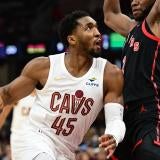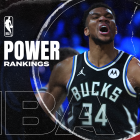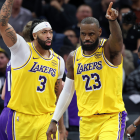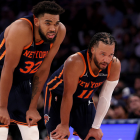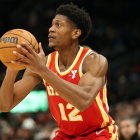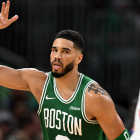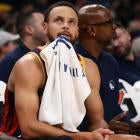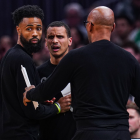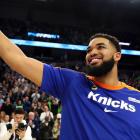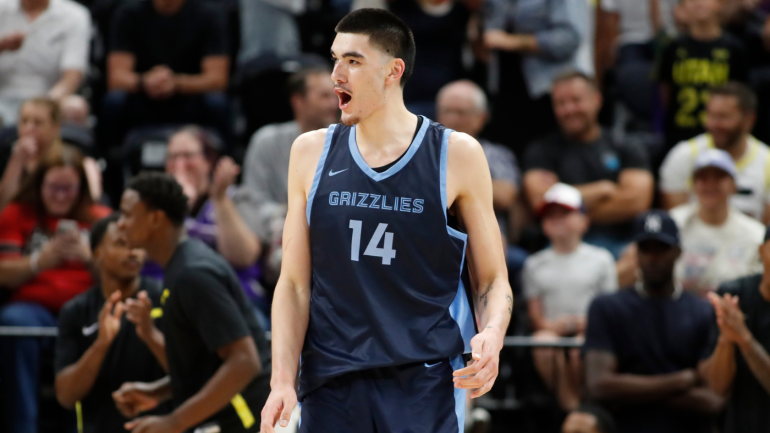
Rookie of the Year is the NBA's simplest award. As we'll cover when we preview all of the others, voters tend to look for certain types of candidates when they're picking most awards. But Rookie of the Year? Nope. That's the stats award. Half of the last 10 winners have been that year's leading rookie scorer. When it hasn't been, it has usually been because they were that season's leading rookie assister, as LaMelo Ball, Ben Simmons and Ja Morant were. Joel Embiid would be in the first group if he'd played more games. The closest thing we have to an outlier lately is Scottie Barnes, who finished third in scoring, third in rebounding and seventh in assists. Most of the time, you can add up the points, rebounds and assists columns and find your winner.
You can generally find your likely winners by whittling down the field in a few easy ways. Top picks generally win this award. Half of the past 16 winners have been No. 1 overall picks. We've only gone outside of the top five twice in that span: for No. 6 overall pick Damian Lillard and for No. 36 overall pick Malcolm Brogdon, who won because of Embiid's injuries. You're usually looking for guards as well, or at least ball-handlers. If you think of the arrival of LeBron James in 2003 as the beginning of the modern era, we've only had four big-man winners in this relevant time period: Emeka Okafor, Blake Griffin, Karl-Anthony Towns and Victor Wembanyama. We've had forward-size ball-handlers like James, Kevin Durant and Paolo Banchero win, but they all led their teams in usage rate in doing so. Most often, we're looking for a guard who's going to have the ball a lot.
Now, this is where things get complicated: are any 2024 rookies going to have the ball a lot? This draft class was, by popular consensus, among the least promising in NBA history. The top two picks were projects that don't play guard. The highest-picked guard, Reed Sheppard, is joining a back-court rotation that already has two recent top-five picks (Jalen Green and Amen Thompson) and a max-contract player (Fred VanVleet). The top-five was rounded out by non-shooters. Stephon Castle shot 26.7% on 3's at UConn. Ron Holland shot 23.9% in the G-League. Forget about finding a high-usage rookie in here. If you're confident you can find a rookie who's even going to get steady minutes, that's a candidate worth discussing.
So let's dive into this year's Rookie of the Year odds. Where is there value in a class without an obvious favorite?
The favorites
Candidates whose longest current odds are +1000 or shorter
Please don't bet on the No. 2 overall pick. Alex Sarr (+1000) shot 19.1% from the floor at Summer League. Do you know how hard that is to do as a center? Sarr has long-term upside. He cannot create his own shot at the moment. This is a counting stats award. The Wizards have no one to create shots for him. I'm more optimistic about Matas Buzelis (+1000) providing value as a rookie, but I can't see him actually winning this trophy. Again, think counting stats. The Bulls traded for Josh Giddey to give him the ball. Zach LaVine, Coby White and Nikola Vucevic are still here. He's not going to accumulate numbers.
I don't think the odds are long enough to justify a Stephon Castle (+1000) bet. If he's a league-average 3-point shooter as a rookie he probably wins the award. There's just no real evidence that he's going to be there so soon. He's barely even an average free-throw shooter at this stage, and that's going to pose problems in an offense with a Hall of Fame point guard (Chris Paul) and one who swung the team's entire plus-minus whenever he played last season (Tre Jones). The touches probably won't be there for a 3-point shooter who hits below 30% of his attempts to accumulate the needed stats.
There will likely be a moment in which a Reed Sheppard (+700) bet makes some sense. I don't think it will in the preseason. Fred VanVleet and Jalen Green are ahead of him in the backcourt pecking order. Amen Thompson is as well, though he isn't as easily positionally classified. Green and Alperen Sengun, at least as of this writing, are both playing for contracts, so it's hard to know how stat-focused either of them will be, and Ime Udoka is extremely demanding of young players. Sheppard is going to have to prove that he can hang on the floor defensively. He'll do so eventually. Though unconventional, he generates value through turnover-generation, and the Rockets have the personnel to cover his deficiencies. They badly need his shooting. It just seems more likely that he's acclimated over time and takes on a bigger role as the season progresses. Check in on him around Dec. 1, especially if you're dubious of any other candidate taking a commanding early lead.
Zach Edey (+550) is the only player in this tier that I'd feel comfortable making a preseason bet on. We're relatively certain he's going to start. Jonas Valanciunas set a blueprint for how the Grizzlies plan to use this type of player, and if Edey can replicate his numbers he's going to be in the thick of this thing. He's an old rookie at 22, so the learning curve will be shorter, and while there are certainly playoff question marks on defense, his pure size and the role clarity he gains by standing next to Jaren Jackson Jr. means he's going to rack up blocks. It's a chalky pick, but the truth is that Edey is the only rookie in this class that comes with relative certainty in both role and production. We know what he's going to be. Everyone else is a question mark.
The middle of the pack
Candidates whose longest current odds are between +1000 and +2500
My favorite pick on the board is Bub Carrington (+1600), though that is largely a function of circumstance. Playing for Washington kills Sarr's candidacy because he has nobody to set him up. Playing for Washington is perfect for Carrington because he doesn't need to be set up. He projects as a ball-handler on the league's least-serious team. If he wants to take average double-digit shot attempts who's going to stop him? All the Wizards care about at the moment is developing their youth. They want Carrington to explore the studio space. That's an environment conducive to stat accumulation. If he's good, he's going to have every opportunity to win this award. That won't be the case for potentially superior prospects playing on teams with loftier immediate ambitions.
If you're looking for another candidate in this range to bet, you could make an argument for Rob Dillingham (+1700) using Ben Gordon logic. In 2005, Ben Gordon finished second in the NBA in Rookie of the Year voting because he actually won Sixth Man of the Year. An electric rookie bench scorer for a winning team has a chance in a weak field, and The Timberwolves are very invested in turning Dillingham into that scorer. They drafted him to eventually replace the 36-year-old Mike Conley, so getting him reps now is going to matter. Minnesota's offense was nearly seven points worse per 100 possessions when Anthony Edwards rested last season. If there's a solution to that problem on their roster, they are going to empower whoever provides it. The trouble is that Dillingham isn't the only candidate to do so. Minnesota drafted a similar prospect, Terrance Shannon Jr. (+4000), at No. 27 overall. In truth, I suspect the two of them will dilute one another enough to take both out of the race. However, on a pure value play, I'd just prefer the Shannon odds. He's much older at 24, and Dillingham is still fairly raw.
Nothing else in this range is especially notable. No. 1 overall pick Zaccharie Risacher (+1300) is playing on Trae Young's team, so it's hard to see him controlling enough possessions to get in this race. Even if he could, he's also competing with teammates Jalen Johnson and Dyson Daniels for minutes and touches at forward. They'll likely play together, but none of the three are off-ball spacers. They all need the rock. They'll all cut into one another's touches. In Portland, Donovan Clingan (+2000) is stuck behind Deandre Ayton (and, for now, Robert Williams III). Even if Pistons pick Ron Holland could shoot, none of his teammates can, so there's not going to be enough space for any theoretical scorer to be optimized there.
I suppose you could form a theoretical argument for Dalton Knecht (+1300) under the logic that he's an older shooter with a head coach who once shared his playing style. JJ Redick is going to know how to use shooters. LeBron James obviously does as well. But there are just so many Lakers with defense deficiencies ahead of him in the pecking order. How many minutes can Knecht really play when Austin Reaves and D'Angelo Russell are full-time starters? Someone has to defend the point of attack. I won't stop you from making this bet. It's just not one I'd advise.
The long shots
Candidates whose longest current odds are longer than +2500
No, you should not bet on Bronny James (+30000). Don't donate your hard-earned money to the books. Now that that's out of the way, this is the point of the list in which team matters much more than player. Teams will force the issue with high picks. The investment is significant enough to work them into lineups whether they're good or bad. But low picks? They vary significantly. The stakes are usually too high for good to justify consistent minutes for them unless the roster situation is dire. Bad teams vary on a case-by-case basis. Sometimes they play for developmental purposes. Sometimes they spend most of the season in the G-League. And occasionally, they might get some extra minutes here and there for the sake of tanking. Hey, just because a player if putting up numbers doesn't mean he's contributing to winning. So at this point, unless you have a personal reason to take a swing on a long shot, we're looking at fit above all else.
Do I think the Pelicans will use Yves Missi (+20000) all that much? No. But the only other center on their roster is Daniel Theis. Missi is expected to be a project. Dereck Lively was as well a year ago. At 200-to-1 odds, I'm open to Missi wowing in camp and earning minutes that appear to be very available. The Pelicans are probably going to have to play small ball this season given their personnel, but there's no reason to believe they wouldn't play more traditionally if someone on their roster compelled them to. Jonas Valanciunas didn't exactly fit with Zion Williamson. They played together plenty anyway.
Keyonte George played the fifth-most minutes among rookies last season and attempted the fourth-most shots. That is the blueprint for Utah selection Isaiah Collier (+8000). Right now, he is blocked by George and veteran guards Collin Sexton and Jordan Clarkson. Utah's last two seasons have started well before Danny Ainge has sold off veterans at the trade deadline to go into a full-blown tank. Collier was an elite recruit before a messy season at USC hurt his draft stock. Perhaps arriving in a more stable situation helps get him back on track. If it does, we know the opportunity will be there for him, especially down the stretch.
Kyshawn George (+8000) gets the same Wizards boost that Carrington does. Shannon, as we covered, has a case for the same reasons Dillingham does. Beyond that group, you'll have to pay attention to the preseason to see which, if any, surprising rookies stand out. One or two unexpected rookies will sneak onto ballots. Brandin Podziemski and Jaime Jaquez Jr. both got votes outside of the lottery a season ago. The buzz surrounding them came relatively early. Last year's class was too strong for them to seriously compete for the trophy. This year's is not. If you notice camp or preseason standouts in situations that might lend themselves to a rookie putting up numbers, it's worth taking a preseason flier.





